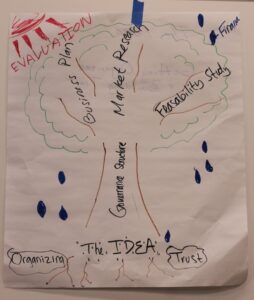
Written by Nichelle Brunner
Walking into Room 105 of the Urban Outreach-Engagement and Research Center (UROC) in North Minneapolis, the room setup is perfect for group discussion, planning and work around cooperatives. The large room is filled with tables draped in colorful table cloths, and on the front walls, the co-op values and principles are centered.
In the room, there are over 20 community members, business owners and partner organizations who have come ready to engage and to learn about cooperatives and their role in our cultural history.
This was the first of a 2-part Co-op Learning Series hosted by Nexus Community Partners, a community building intermediary in the Twin Cities. Repa Mekha, President and CEO of Nexus, opened the meeting by introducing the Nexus staff and Nexus’ commitment to a strong, equitable and just community in which all members are afforded multiple access points to generate and sustain wealth.
During the almost 3 hour long meeting, Nexus introduced the room to the definition of a cooperative, the importance of culturally-based economic development, and the idea of using cooperatives to build democratic communities.
Storytelling, power, and cooperative movements
Following the introduction, LaDonna Redmond, Seward Community Coop’s Diversity and Community Engagement Manager, approached the mic stand.
With a commanding and energetic presence, LaDonna set the foundation of her presentation by defining exactly what a coop is.

“One, a coop is a legal structure. That means it’s a business. Two, it also has a social justice lens. These two things tend to overlap in a coop structure.”
Once the foundation was set, LaDonna presented the history of coops and the importance of power and oppression in storytelling.
“I will start with telling the story of the Rochdale Pioneers. They say the Rochdale Pioneers in 1844 created the contemporary coop movement, meaning that they codified, or wrote down, the principles [of coops] as they understood them. So they show you a picture of 10 white men in England, where one of the dudes had the baddest mushroom haircut I’ve ever seen in my life,” LaDonna said, as the room erupted in laughter.
“But what they don’t tell you is the Rochdale Pioneers organized themselves to take control of their economic destiny. That doesn’t come across when you see the photo of these 10 white men. Me, a Black woman, when I saw this I thought, ‘This is only for white people.’ So when we talk about the narrative of coops, we have to talk about power and who has the power to tell these stories.”
For the next 30 minutes, LaDonna challenged the “white’s only” cooperative narrative by highlighting the stories and histories of Blacks in the United States.
“In 1787, 60 years before the Rochdale Pioneers, Africans formed cooperatives for their freedom in the U.S. The Black Panthers 10 Point Platform has the same values as our local coops. When someone asks me what is a coop and cooperation, I say it’s the Underground Railroad. It’s all the pieces and principles coming together.”
Back to the basics

For the final part of the meeting, guests were asked to get in pairs and participate in a gallery walk. On the walls of the room were pictures and descriptions of various coops, such as New York City’s Colors Cooperative, Oakland’s Mandela Marketplace, Pine Ridge Reservation’s Owíŋža Quilters Cooperative and Minneapolis’ Village Trust Financial Cooperative. As they circled the room, the pairs reflected on common themes and coop principles.
At the end of the gallery walk, guests shared their final thoughts and what resonated with them regarding cooperatives. One participant commented on one thing that is missing from nonprofit and federal programs.
“When we transition programs to nonprofits and to the federal government, community is lost in this transition. Coops can bring that back,” said one participant.
Everyone stressed the importance of getting back to the basics, as was summed up by one of the final thoughts of the evening.
“Capitalism and white supremacy are in place so we don’t practice what is at our basic core. If you take away those things, cooperation is human nature. It makes sense because it’s who we are.”
If you have any questions regarding the Cooperative Learning Series, feel free to reach out the Nkuli Shongwe, the Community Wealth Building Coordinator- nshongwe@nexuscp.org